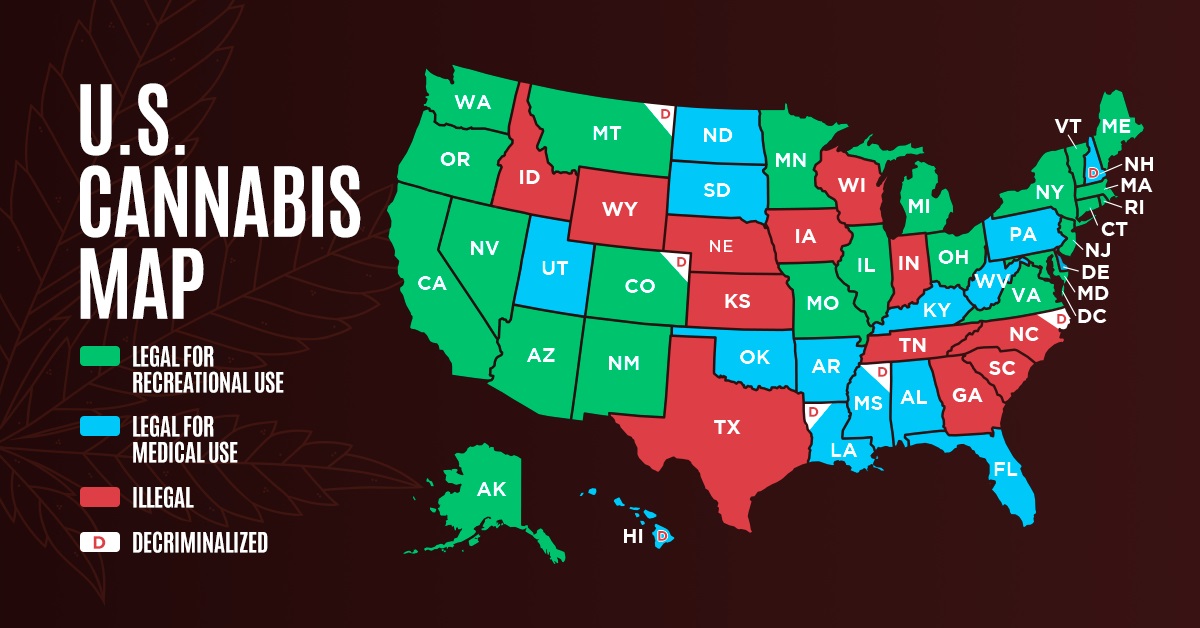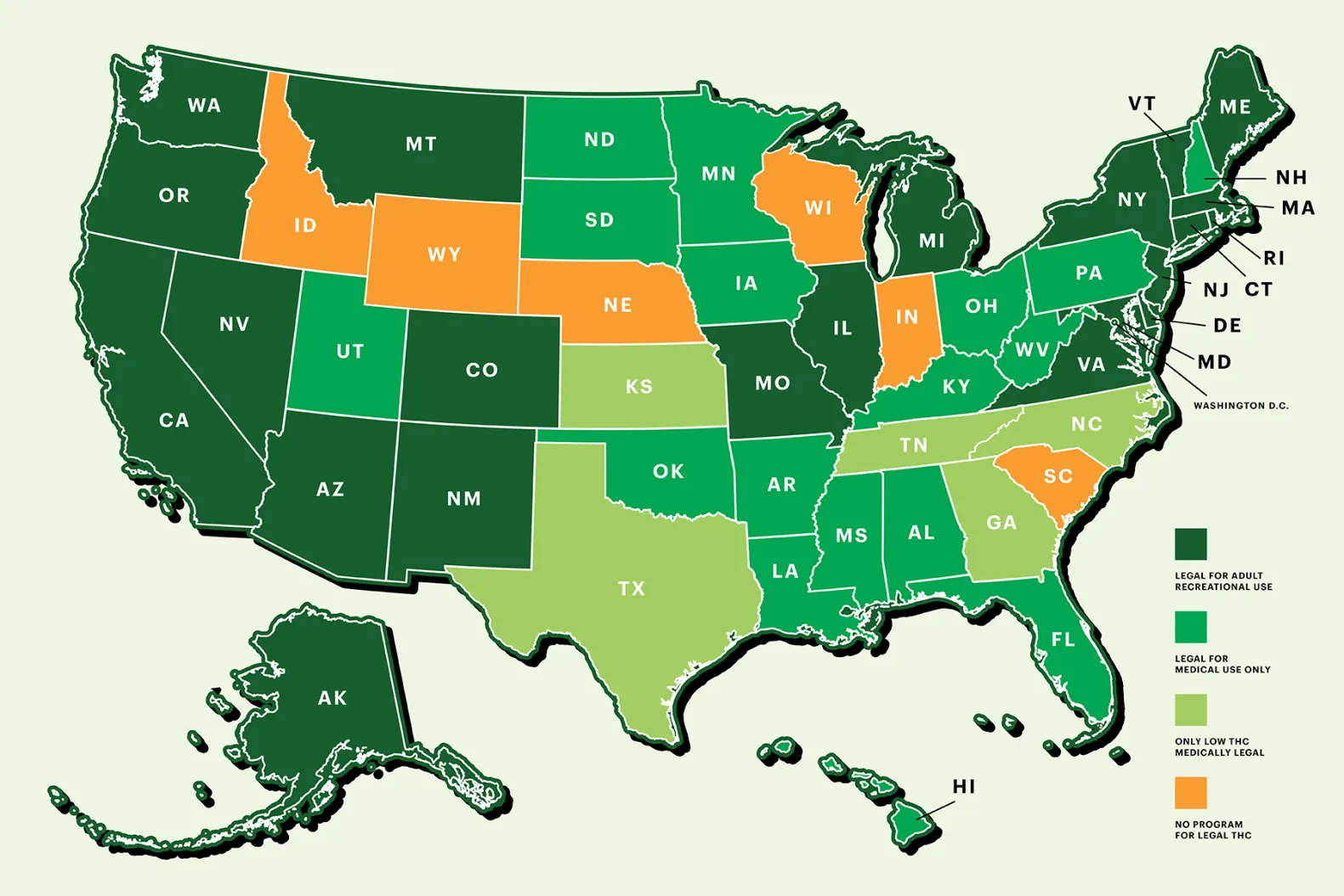
As of July 2024, the landscape of cannabis legalization in the United States is diverse and evolving. Federally, the consumption of cannabis remains prohibited as a federally scheduled substance. According to the Associated Press in the spring of 2024, there are plans by the Drug Enforcement Administration to move cannabis to the less-restrictive Schedule III substance.

At the state level, a total of 24 states to date have fully embraced cannabis, allowing both recreational and medical use for adults over the age of 21. These states include well-known pioneers like California and Colorado, along with newer entrants such as Minnesota and Ohio. Permitted possession for of-age adults does vary from state to state, so always make sure to review a state’s policies before purchasing, carrying, or consuming (and always consume responsibly!). Below is a full list of states where both medical and recreational use is permitted:
- Alaska
- Arizona
- California
- Colorado
- Connecticut
- Delaware
- Illinois
- Maine
- Maryland
- Massachusetts
- Michigan
- Minnesota
- Missouri
- Montana
- Nevada
- New Jersey
- New Mexico
- New York
- Ohio
- Oregon
- Vermont
- Rhode Island
- Virginia
- Washington
In addition to these states listed above, a total of 38 states have legalized medical cannabis use programs provided a medical professional’s recommendation…with some states also featuring decriminalization or partial reforms. States like Hawaii and Pennsylvania fall into this category, although the extent of legal reforms varies. For instance, in Pennsylvania, certain cities have decriminalized cannabis possession, adding another layer of complexity to the legal landscape. Below is a full list of states where only medical use is legal:
- Alabama
- Arkansas
- Florida
- Hawaii
- Kentucky
- Louisiana
- Mississippi
- New Hampshire
- North Dakota
- Oklahoma
- Pennsylvania
- Utah
- South Dakota
- West Virginia
A few states, including Georgia and Nebraska, have implemented limited decriminalization policies, while others such as Idaho and Wyoming maintain strict prohibition. The list of states where cannabis remains heavily illicit includes:
- Georgia
- Idaho
- Indiana
- Iowa
- Kansas
- Nebraska
- North Carolina
- South Carolina
- Tennessee
- Texas
- Wisconsin
- Wyoming
Iowa has a very limited medical cannabis program that tolerates THC – but the amounts that are legal are so low that it is not a state with a medical use cannabis program in the same conversation as the states listed above.
The District of Columbia and several U.S. territories, including Guam and the US Virgin Islands, offer various levels of cannabis legalization, with some allowing both recreational and medical use:
- District of Columbia – adult use and medical use are both legal
- American Samoa – fully illegal
- Guam – adult use and medical use are both legal
- Northern Mariana Islands – adult use and medical use are both legal
- Puerto Rico – medical use is legal
- US Virgin Islands – adult use and medical use are both legal
Globally, the trend toward legalization and decriminalization continues to grow. Countries like Canada, Mexico, and Germany have established comprehensive legal frameworks for cannabis. Meanwhile, places such as South Africa and Thailand are making strides with progressive cannabis policies, reflecting a broader shift toward acceptance and regulation around the world. The list of countries with legal or decriminalized use of cannabis includes:
- Canada
- Mexico
- South Africa
- Germany
- Switzerland
- Georgia
- Thailand
- Jamaica
- Uruguay
The changing tide of cannabis legalization worldwide is making marijuana increasingly accessible for patients in need to access its medicinal uses for treatment and provide the freedom for of-age adults to enjoy cannabis responsibly. This global shift toward embracing tolerant cannabis policy not only showcases increasing respect for personal freedoms but also underscores a growing commitment to safe and regulated access for patients in need and of-age adults alike.

Disclaimer: All information provided is strictly for educational purposes only and is not legal or medical advice or opinion in any way. Readers retain full responsibility for the use of the information contained herein. Any individual or entity seeking legal or medical counsel or a determination of legal rights should seek the counsel of a licensed attorney, designated official of the applicable regulating agency, and/or qualifying health professional.
Helpful Links:
Maps:
- MARIJUANA LEGALITY BY STATE – Updated July 3, 2024 | DISA
- Cannabis World Map: Interactive Map of Cannabis Laws
Other helpful sources:
Legality of cannabis by U.S. jurisdiction – Wikipedia





